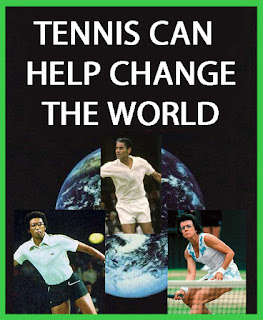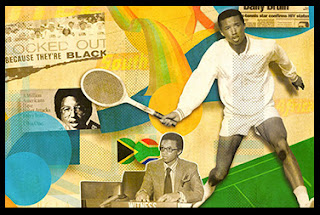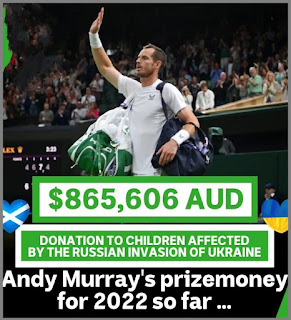"It's just a game."
These words are often said at matches and practices by those who contrast tennis with seemingly larger things in life. But on reflection, I suggest that this sells tennis short --- and that tennis represents much more than "just a game."
Tennis is a shared emotional and visceral experience. It's played by people from all walks of life, in every age group, and at every level of play. Players and fans range from wealthy to poor, from elites to working class, from club VIPs to kids with homemade rackets.
From the days when it was enjoyed almost exclusively by the privileged few in wealthy clubs in Western Europe, tennis has evolved into the second biggest global sport after soccer. Top players now come from all over the world, and passionate followers are found in hundreds of countries. And it serves to unite people and cultures at vast distances.
Even more, tennis at its best operates as a platform to send powerful messages and help improve and elevate life. Let's look closer at how.
Tennis can:
*Advance equality and equal opportunity
*Promote social causes and combat societal problems
II. Advancing Equality and Equal Opportunity
Since it was first introduced in 1874 as "Lawn Tennis" by Major Walter Clopton Wingfield of Wales, tennis and its cumulative history as a modern sport has demonstrated at least one thing.
Tennis is a global force for equality and equal opportunity in the world.
Let's check the biographies of three (3) legendary American players, who by their successes on and off the court, indisputably advanced equality in their times.
1. Richard "Pancho" Gonzalez (Man with a Racket)
"The great champions were always vicious competitors."
Born into a relatively poor Latino family in the barrios of Los Angeles in 1928, the scrappy kid Richard "Pancho" Gonzalez picked up a racket and went on to change the nature of the sport in his era.
In his day, tennis was considered an elite game. It was showcased exclusively in rich country clubs and enjoyed predominately by privileged white males. But as his tennis accomplishments grew, Gonzalez was invited to play at famed country clubs.
They called him "Pancho" --- but it was a name he disliked because in those days it was often used as a slur for Mexican-Americans. Yet as fate would have it, it is the name history best remembers him by.
Gonzalez years later revealed that throughout his career he had faced discrimination because of his heritage and social class. But he was never deterred, and always pushed forward.
Gonzalez was an all-court player with a signature cannonball serve, and a superb net volley game. Gonzalez went on to build a history-making tennis career, winning 15 major singles championships, including 2 U.S. Open titles, in the pre-Open era.
He was ranked World Number One for 9 consecutive years from 1952 to 1961, establishing himself as an indomitable competitor with a fierce temper. Gonzalez is often rated by historians as one of the greatest players of all time.
But beyond his on-court accomplishments, Gonzalez was the first modern American player to break traditional tennis barriers of social class and color in his day. He gained wide public acceptance, and thus blazed a trail for what was possible for future minority tennis players and sports athletes. Gonzalez taught, coached and served as mentor to younger players, thus leaving an enduring legacy.
Arthur Ashe, the great African-American champion whom Gonzalez helped teach and who himself battled discrimination, once remarked that Pancho Gonzalez "was the only idol I ever had."
Gonzalez was inducted into the International Tennis Hall of Fame in 1968. Today, the Richard Pancho Gonzalez Youth Foundation carries on the work of developing tennis youth in his name.
2. Arthur Ashe (Citizen of the World)
"Start where you are. Use what you have. Do what you can."
Born in 1943 into segregated Richmond, Virginia, the capitol of the old Confederacy, the skinny bright kid Arthur Ashe showed an early powerful flair for tennis. He developed his game and won a tennis scholarship to UCLA, and led them to an NCAA Championship in 1965, while earning a B.A. in Business Administration.
Ashe went on to turn professional and win a multitude of titles, and become one of the most prominent tennis players of his time. Overcoming discrimination throughout his life, Ashe became the first African-American male to win the U.S. Open, Wimbledon and the Australian Open, and play for the winning U.S. Davis Cup team in the 60s and 70s. Millions around the world looked up to him as a global icon, rivaling Muhammad Ali and later Michael Jordan.
Utilizing his tennis success and prominence as a platform, Ashe advocated for what he believed as rightful causes. In fact, his path became a blueprint for today's modern activist athlete. Ashe pushed for better pay for players, better opportunities for African-American youth, and helped form what is today the Association of Tennis Professionals (ATP).
Later when he was denied a visa to play in South Africa's tennis tour, he took up the cause of the anti-apartheid movement. And after his playing career ended, Ashe contracted HIV from a surgery blood transfusion, but decided to use the opportunity to fight for AIDS research and funding.
Always the mentor, Ashe taught tennis, and inspired youth and children. Today, a wide array of youth development programs and scholarships around the country leave his lasting mark.
Ashe passed away in 1993 at the age of 49. That same year 1993, he was posthumously awarded the Presidential Medal of Freedom, our nation's highest civilian honor, for his work as activist, humanitarian and player. Today, the U.S. Open stadium is named in his honor, and each year opens with the Arthur Ashe Kids Day to carry on his legacy.
3. Billie Jean King (Queen of Tennis and Social Change)
"I wanted to use tennis for social change. My whole life has been about equal rights and opportunities. For me, it really goes back the health of mind, body and soul."
As the 11 year-old daughter of a fireman in California in the 50s, Billie Jean King picked up a racket that she bought for $8 from chores --- and declared that she would be the number one player in the world one day.
She went on to do just that, and in the process win 39 major titles in the 60s and 70s: 12 Grand Slam singles titles, 16 womens doubles titles, and 11 mixed doubles titles. She also helped win 7 Federation Cup titles, the premier international women's tour championship.
From her early playing days in the pre-Open era, King fought for pay equity for women players. She heavily criticized the United States Lawn Tennis Association (USLTA) in 1967 for breeding an elitist system by offering top players cash under the table to play tournaments. Her voice was instrumental in helping to professionalize and upgrade tournament play in the Open era.
She sought to elevate women's tennis in 1973 by founding what is today the Womens Tennis Association (WTA). The next year 1974, she co-founded the mixed doubles league now known as World Team Tennis (WTT). She was named its first commissioner, and thus became the first prominent woman commissioner in professional sports.
King might best be remembered today by many fans for her publicity match in 1973 with the 55 year-old Bobby Riggs at the Houston Astrodome dubbed the "Battle of the Sexes." She won in 3 sets before 50 million U.S. viewers and 90 million worldwide. King's victory was then considered a touchstone in public acceptance of women's tennis.
King later remarked on the match's pivotal nature: "I thought that it would set us [women's tennis] back 50 years if I didn't win that match." The contest was later showcased in the 2017 movie "Battle of the Sexes", starring Emma Stone.
In 1981, King publicly came out as a lesbian, becoming the first prominent professional athlete to do so. She began speaking out for the LGBTQ community, and for their rights and acceptance. King built a lasting friendship with gay music superstar Elton John. And together they raised visibility and money for both AIDS-related causes and LGBTQ programs to reduce stigma and suicide.
Throughout her career and life, King championed not only women's equality but also LGBTQ rights and dignity, with her tennis, her voice and her courage. She was awarded the Presidential Medal of Freedom in 2009, and the French Legion of Honor Award in 2022. The prestigious Federation Cup was re-named the Billie Jean King Cup in 2020.
Today, the U.S. Open is played each year --- on equal terms for men, women and LGBTQ --- at the re-dedicated Billie Jean King Tennis Center.
III. Promoting Social Causes and Combatting Societal Problems
Building on the trailblazing examples of Gonzalez, Ashe and King, tennis has evolved into a new phenomenon. Today, players often use their tennis voice and platform to help serve as a vehicle for social change. One example is Serena Williams, 23 time Grand Slam champion, who has consistently supported the Black Lives Matter (BLM) movement which seeks to uplift the lives of young African-American men and others.
In October 2015, Serena wrote: "So to those of you involved in equality movements such as BLM, I say this: Keep it up! We can keep working even more to increase equality."
Today, the Serena Ventures Fund offers more than $100 million in venture capital to support qualifying minority and women start-up businesses and help level the playing field.
Along those lines, 4 time Grand Slam champion Naomi Osaka at the 2020 U.S. Open highlighted episodes of recent racial injustice. She wore Covid masks showcasing the names of George Floyd, Breonna Taylor and others. Osaka commented: "I'm a vessel to spread awareness." And she carried that message long after she won the championship that year.
Moving on higher, other Global Challenges such as addressing Climate Change and standing up for Peace and against War have been championed by many players and groups in the tennis community.
For instance, Novak Djokovic, Dominic Thiem and many others have voiced and warned about the issue of Climate Change, the accelerating danger to our planet from extreme weather arising from carbon emissions.
Djokovic, and the four Grand Slam Championships, have supported various efforts to combat climate change, including the U.N.'s "Sports for Climate Change Action". This global program advocates an environmentally-friendly lifestyle, in a bold effort to save the Earth for the next generation.
Meanwhile, peace and war issues became urgent after the Russian invasion into Ukraine in February 2022. World Number one Daniil Medvedev of Russia stood up for Peace and against violent conflict, explaining that "tennis sometimes is not that important" and "by being a tennis player, I want to promote peace all over the world."
World Number five and fellow Russian Andrey Rublev added his voice to the Anti-War cause and remarked: "You realize how important it is to have peace in the world and to respect each other no matter what and to be united."
Beyond simply voicing causes, the tennis community collectively has done even more: it has raised money, recruited resources and helped build solutions to societal problems. For example, after the Indian Ocean Tsunami in 2005, the ATP, WTA and others rallied to raise funds for disaster relief. Players auctioned off signed rackets, donated part of their winnings and and staged charity matches.
The same happened again many times such as after the disasters of: the Japan Earthquake in 2011, the Australian Wildfires in early 2020, the Global Pandemic in 2020-21, and the Ukraine-Russia war of 2022. In this way and over the years, the tennis community has secured millions of dollars and other massive disaster assistance after tragedy.
Today, the tennis world is working on forward-thinking social goals such as promoting youth education and building schools, thus bettering society for the next generation.
IV. Conclusion: Tennis as a More than a Game
Just a game? No, it's much more. In a myriad of ways and over many decades, tennis has contributed something far more profound than merely the score of the match or the four corners of the court.
By advancing equality and equal opportunity, promoting social causes, and combatting global challenges with funds and resources, tennis --- and its players, fans and supporters --- help change the world for the better!












No comments:
Post a Comment